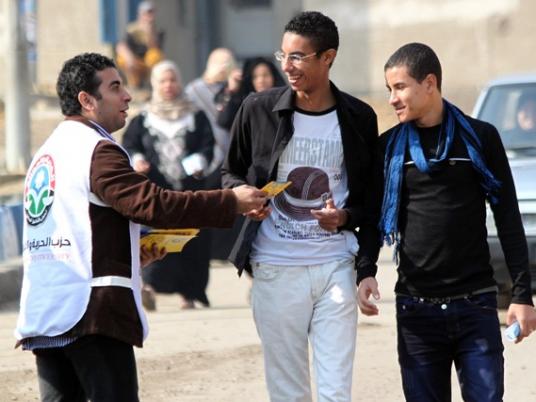
Mostafa Mahmoud Square in the Giza neighborhood of Mohandiseen was home to what felt like a street carnival on a recent afternoon. A few days before parliamentary elections began in Giza Governorate, hundreds ― whole families and people of all ages ― gathered, singing. Large balloons provided a festive touch.
But there was more to the scene than just cotton candy and sing-alongs. Hundreds were also spread out in the nearby streets, smiling widely and handing out fliers to passersby.
This was one of the daily campaign events that the Muslim Brotherhood's political wing, the Freedom and Justice Party (FJP), has been holding all over Egypt in an effort to dominate the ongoing parliamentary elections. So far, the FJP has succeeded: In the first phase of People's Assembly elections at the end of November, the Islamist party took nearly 40 percent of the vote. And in the second phase, taking place on 14 and 15 December, they appear poised to do just as well.
Benefiting from its long history of street presence, the FJP has devised a campaign strategy that uses a variety of tactics specifically tailored to the inhabitants of individual neighborhoods.
FJP campaigners say that while the party’s broad campaign strategies are centrally determined, local organizers choose what they think will work best in their own areas.
While the Brotherhood’s classic tools ― religious campaigning and providing social services ― are still used effectively in some areas, the party is also deploying new tactics in others that are resistant to overly religious arguments and don’t have as strong a need for social services.
“The Brotherhood has been with the people for a long time; they served them a lot and they are everywhere,” said Eman Maged, an FJP member standing at a campaign booth in the Dokki neighborhood in Giza.
Maged said that because of the Brotherhood’s large base, FJP volunteers are usually from the neighborhoods where they campaign, making it easier for them to relate to voters.
Ahmed Ali, resident of the Azazy region in Sharqiya, has been trying to convince his village to consider other parties, but says they are “brainwashed by the Muslim Brotherhood to believe that they are the only Muslims and others are not.”
Ali says that the Brotherhood cultivated its base throughout the years by developing social and athletic activities to gather people around, being present at social occasions such as weddings and funerals, and speaking as the sole representative of Islam.
In its national campaign, the FJP has steered away from religion to avoid raising fears that it will attempt to implement Islamic rule. Because of regulations banning the use of religion in electoral campaigns, the party was unable to use its well-known slogan, “Islam is the solution.” Even though the party was initially unhappy with the restriction, it eventually came around to a new slogan, “We bring good to Egypt.”
“There is a lot of development in the Brotherhood’s campaigning,” said Kamal al-Helbawy, a former Brotherhood spokesperson. “They didn’t use religious slogans, but instead focused on the values that are the essence of religion without mentioning it.”
Maged says that in wealthier neighborhoods, like Dokki, FJP campaigners try to reassure voters about fears that the Islamist party will suppress personal freedoms.
“Here, the most effective campaigning is for us to make an appearance, just the way we are, so that people can see that the Brotherhood members are people who are well-dressed, speak English and are articulate,” said Maged, adding that her modern appearance dispels stereotypes of Brotherhood members with full face coverings or beards.
She said the FJP campaigners try to hold “patient conversations” to introduce the party to constituents. The campaigners try to convince skeptics that the party doesn’t seek to dominate the parliament, will not enforce religious rules, and doesn't receive foreign funding, she continued.
Maged said that in other areas, the conversation with voters is very different.
“In poorer areas, they don’t care about any of that, they ask about work, pensions and bread, and we tell them that the party aims at fixing these problems gradually,” she explained.
She noted that in some areas, the party recognizes that words alone will not do the trick.
“In these areas, you can reach the people through services more than anything else,” she said, adding that the FJP offers medical services, food supplies and free additional education for students.
In Azazy, the Brotherhood's provision of services was fresh on voters’ minds on the eve of the second round.
“Since the days of Mubarak, the Muslim Brotherhood has been there for anyone in need. Not only now at the time of elections; for 10 years they have served us and showed that they’re good people,” said mechanic Ahmed Abdel Moneim.
Abdel Moneim said the Brotherhood has around 20 known members in the village that those in need go to for medicine, clothes or other basic goods.
While voters in some governorates and rural areas cited piousness as the party’s strongest attribute, many in Dokki were relieved at the sight of unveiled women campaigning for the FJP, dispelling fears of the party imposing a conservative agenda.
Hassan Abu Taleb, a political analyst, said that while the Brotherhood did not need much help given its history and experience, it excelled in campaigning regardless. He noted that the group made good use of its history in street campaigns, while newer parties confined themselves to Tahrir Square and old parties failed to make use of their experience.
“It was a combination of mistakes from other parties and positive developments for the Muslim Brotherhood,” said Taleb.
Taleb also said that the FJP chose its name wisely. “These two words represent the essence of the revolution for simple people, so they feel that by voting for the Freedom and Justice Party, they are supporting the revolution.”
Taleb’s theory appears to hold true. “Freedom is good and justice is good,” one Imbaba voter told Egypt Independent when asked why he was supporting the FJP.




